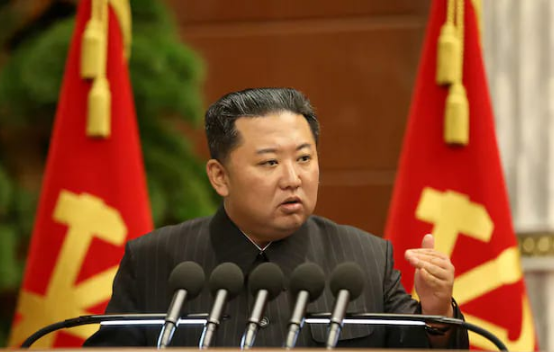North Korea on Monday condemned a new defense pact by the United States, Australia and Britain, and a plan to share nuclear submarine technology with Australia, saying the deal could trigger a nuclear arms race and upset the balance in the Asia-Pacific region.
The Biden administration announced the three-nation pact, called AUKUS, on Wednesday. The surprise decision to share sensitive nuclear submarine technology with Australia has already prompted a swift backlash from China — the apparent target of the pact — and set off a diplomatic spat with France by scuttling an earlier deal in which Australia would have purchased 12 French diesel-powered submarines.
These are extremely undesirable and dangerous acts which will upset the strategic balance in the Asia-Pacific region and trigger off a chain of nuclear arms race,” North Korean state news media Korean Central News Agency quoted a Foreign Ministry official as saying.
“It is quite natural that neighboring countries including China condemned these actions as irresponsible ones of destroying the peace and stability of the region and the international nuclear nonproliferation system and of catalyzing the arms race,” the official added.
The North Korean condemnation comes just days after Pyongyang test-fired a pair of ballistic missiles and a new long-range cruise missile, stoking tensions in the first public testing activity in months amid a prolonged deadlock in nuclear talks with Washington. North Korea has so far not responded to outreach efforts by the Biden administration.
State media reported that North Korea developed the cruise missiles over two years, fulfilling key defense goals set by North Korean leader Kim Jong Un — a claim that hinted at the possible nuclear capability of the missiles. KCNA described the missiles as a “strategic weapon of great significance.”
South and North Korea have both been developing increasingly sophisticated weapons amid stalled efforts to ease tension on the peninsula. South Korea tested a submarine-launched ballistic missile on Wednesday. In a commentary published Monday by state media, the chief of a North Korean military think tank, Jang Chang Ha, derided the South’s effort as “clumsy.”
In a statement on its defense plans last week, South Korea said that “the military will work to ensure security and peace on the Korean Peninsula by achieving powerful deterrence capabilities through the development of missiles that are stronger, and can go further and with more precision.”
Responding to news of the trilateral security pact on Monday, the unnamed North Korean ministry official described the United States as “the chief culprit toppling the international nuclear nonproliferation system,” adding that its “double-dealing attitude” was threatening “world peace and stability.”
The official said that North Korea will “certainly take a corresponding counteraction in case it has even a little adverse impact on the security of our country.”
Australia said last week it has “no plans to acquire nuclear weapons” and that the submarine proposal will “remain consistent with Australia’s long-standing commitment to nuclear non-proliferation” — a global stance Prime Minister Scott Morrison said all three nations are committed to upholding.
Nuclear-powered submarines have a longer range, and they can travel underwater at a higher sustained speed, than their diesel-electric-powered equivalents. That could offer advantages in a head-to-head confrontation with the Chinese military, which has significantly grown its navy in recent years and plans to expand its fleet of nuclear-powered submarines








































admin in: How the Muslim Brotherhood betrayed Saudi Arabia?
Great article with insight ...
https://www.viagrapascherfr.com/achat-sildenafil-pfizer-tarif/ in: Cross-region cooperation between anti-terrorism agencies needed
Hello there, just became aware of your blog through Google, and found ...